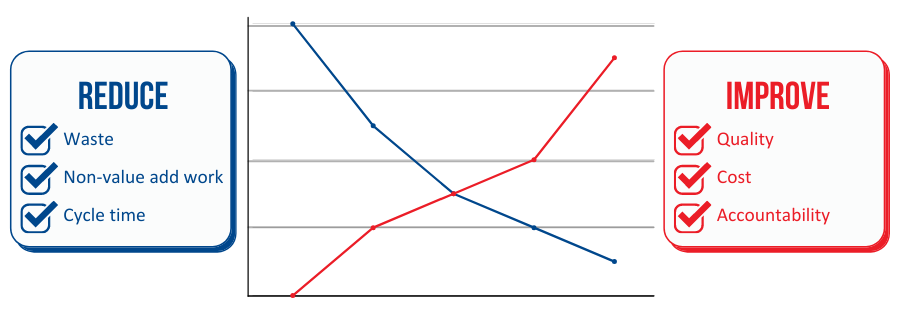What is Six Sigma?
Home / What is Six Sigma?
1. What is Lean Six Sigma ?
Lean Six Sigma is an improvement methodology for process improvement in all forms of work and business.
The principles, methods, tools and techniques are widely used across many successful organizations worldwide to enhance their business processes, efficiency, customer satisfaction and bottom line revenues.
Lean focuses on value through the relentless elimination of waste and acceleration in the velocity of processes. Value is defined in terms of what is important to the customer.
Six Sigma is a well defined, customer focused management system that strives for the delivery of near-perfect products or services. Six Sigma’s goals are to reduce defects and variation so that processes are more consistent and predictable.

Six Sigma evolved side-by-side with Lean, and although once independent entities, they are now combined.
The term ‘Lean’ developed out of the effective implementation of these principles, methods, tools and techniques by Toyota car manufacturing and the term ‘Six Sigma’ was coined by Motorola for their Quality improvement program. Six Sigma, a data-driven approach to eliminate defects in processes where statistical analyses of processes are combined with organizational rewards.

2. How does Lean Six Sigma help organizations ?
Lean Six Sigma provides a comprehensive and proven approach for the positive transformation of any organization by using its principles, methods, tools and techniques to improve the key processes that make up the organization.
Organizations adapting Lean Six Sigma can benefit through:
• Improved Quality of products and services
• Lower amounts of defects, scrap and rework
• Improved delivery times
• Reduced waiting times
• Reduced costs
• Improved customer satisfaction
• Improved employee morale
3. Which organizations can benefit from Lean Six Sigma ?
Lean Six Sigma is applicable for both manufacturing and service industries across all sectors and all sizes of business.
• Manufacturing
• Health Services
• Financial Services
• Retail
• Government Services
• Education
• Oil and Gas Services
• Logistics and Supply Chain Services

4. How Lean Six Sigma can improve your career?
By learning and applying Lean Six Sigma principles and tools in your career, you can become a more effective problem solver and a valuable asset to your organization. Here are some ways that Lean Six Sigma can improve your career:
1. Increase efficiency: Lean Six Sigma helps organizations to streamline processes and eliminate waste, leading to increased efficiency and productivity.
2. Improve quality: Lean Six Sigma focuses on improving quality by reducing defects and errors. By applying Lean Six Sigma principles, you can help your organization to produce higher quality products and services, which can lead to increased customer satisfaction and loyalty.
3. Enhance problem-solving skills: Lean Six Sigma provides a structured approach to problem-solving, which can help you to become a more effective problem solver.
4. Increase your value to your organization: By becoming proficient in Lean Six Sigma, you can become a valuable asset to your organization. You can help your organization to achieve its goals by identifying and eliminating waste, reducing defects and errors, and improving processes.
5. Boost your career prospects: Lean Six Sigma is a highly respected methodology in the business world. By becoming proficient in Lean Six Sigma, you can enhance your resume and increase your chances of advancing in your career.
6. Competitive advantage: When you have a Lean Six Sigma certification, it gives you a competitive advantage over other job candidates. Employers are always looking for individuals who have the skills and knowledge to improve processes and drive efficiency.
7. Higher earning potential: Lean Six Sigma certification can lead to higher earning potential. Many organizations offer salary increases or bonuses to employees who are certified in Lean Six Sigma or who have completed Lean Six Sigma training.
8. Job flexibility: Lean Six Sigma skills are transferable across many different industries and job roles. With Lean Six Sigma skills, you may be able to explore new job opportunities that you may not have been qualified for before.
9. Career advancement: Lean Six Sigma skills can help you to advance in your career. By demonstrating your ability to improve processes and drive efficiency, you may be considered for management or leadership positions.
10. Industry recognition: Lean Six Sigma is a well-respected methodology in many industries. Having a Lean Six Sigma certification or training can demonstrate to employers that you have the skills and knowledge to make a significant impact in their organization.
